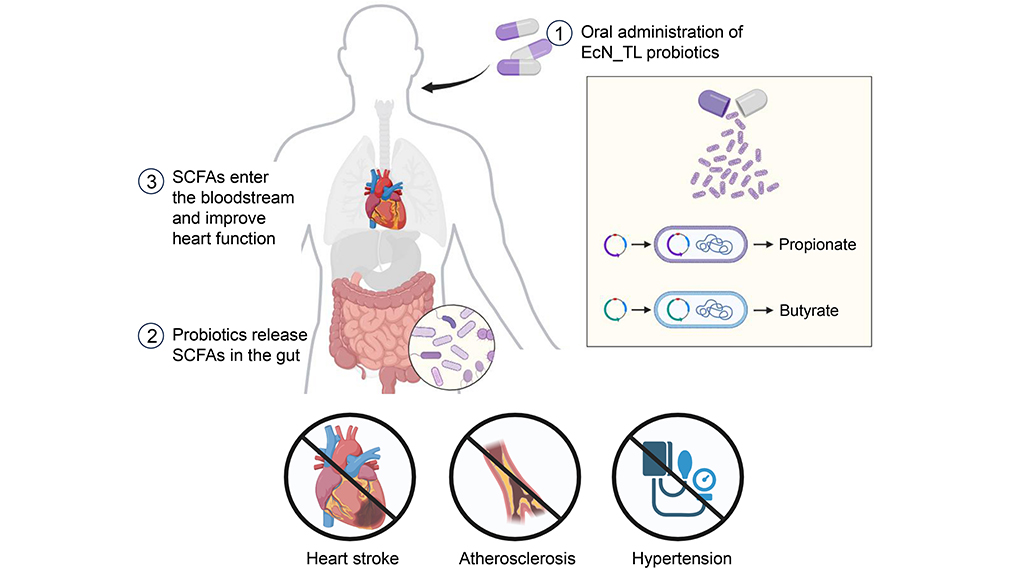
Given the extremely limited regeneration potential of the heart, one of the most effective strategies to reduce the prevalence and mortality of coronary artery disease is prevention. A pioneering publication marks a significant leap forward in this area, spearheaded by a collaborative team led by Professors Terrence C. K. Lau, Kiwon Ban, and Kwan T. Chow from the Department of Biomedical Sciences at City University of Hong Kong, along with Dr Hun Jun Park from The Catholic University of Korea. Their groundbreaking study, titled “Daily Oral Administration of Engineered Probiotics Prevents Myocardial Injury from Ischaemic Heart Disease by Secreting Short-Chain Fatty Acids,” represents a significant advancement in this field and has been published in Cardiovascular Research (Impact Factor: 10.3; Journal Citation Reports, Clarivate, 2023).
Innovative Approach to Coronary Heart Diseases
At the core of this innovation lies EcN_TL, a probiotic formula engineered from a widely available and human-safe E. coli strain. This formulation, designed to continuously release short-chain fatty acids (SCFAs), showed remarkable efficacy in preventing myocardial injury caused by ischaemic heart disease. The oral intake of EcN_TL elevated and maintained an optimal SCFAs concentration in the bloodstream. By administering EcN_TL orally for a mere 14 days prior to ischaemia-reperfusion injury, the team observed a substantial reduction in myocardial damage and a significant improvement in cardiac function, underscoring the potential of SCFA-secreting probiotics in averting coronary heart diseases.

Collaborative Synergy and Expertise
The collaborative synergy among experts in microbiology, cardiology, and immunology has been pivotal to the success of this research endeavor. The study was conducted by PhD students Hoa Quynh Pham, Van Anh Thi Bui, and King Hoo Lim, under the guidance of Profs. Lau, Ban, and Chow, in partnership with Dr Park. The Lau Lab developed the probiotic formula and demonstrated its SCFAs production using mass spectrometry. Simultaneously, the Ban and Park Labs illustrated the cardioprotective effect of SCFAs in cardiomyocytes and animal models. Finally, the Chow Lab investigated the immunological impact of EcN_TL on reducing inflammation. Together, their investigations revealed that EcN_TL's protective mechanisms encompassed the reduction of neutrophil infiltration at the infarct site and the promotion of wound healing macrophage polarization. Additionally, it was revealed that SCFAs, at plasma concentration, shielded cardiomyocytes from inflammation by suppressing the NF-κB activation pathway.
Implications and Future Prospects
This research highlights the potential of synthetic live bacterial therapeutics as a proactive defense against heart diseases. Engineered probiotics are potent biotherapeutic tools and offer new possibilities in cardiovascular health management. Prof. Lau emphasized, “The application of our probiotic EcN_TL, known for its sustained SCFAs delivery, extends far beyond coronary heart diseases. With a broader perspective, EcN_TL emerges as a versatile intervention applicable to various health conditions, promising a shift in therapeutic strategies.”
The future application of EcN_TL and its sustained SCFAs delivery holds promise across different health conditions, signaling a transformative approach to therapy. By exploring uncharted territories within gut-related axes, this research sheds light on the intricate interplay of gut-related pathways. Deeper investigations into probiotics, SCFAs, and the gut-heart axis may pave the way for tailored interventions and precision medicine in cardiovascular health.